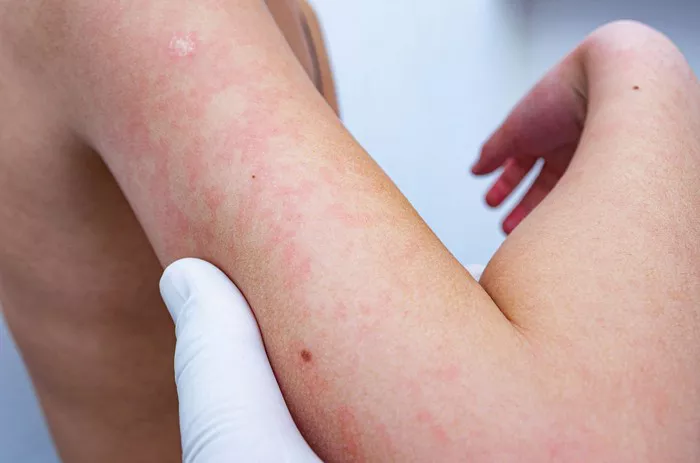Vitiligo is a skin disorder characterized by the loss of pigment in certain areas of the skin, resulting in white patches. While the exact cause of vitiligo is still not fully understood, there is growing evidence to suggest that it may have an autoimmune component. In this article, we will explore the relationship between vitiligo and autoimmunity, examining the evidence from both clinical observations and scientific research.
Understanding Vitiligo
Before delving into the autoimmune aspect of vitiligo, it is essential to have a basic understanding of the condition itself. Vitiligo affects approximately 1% of the world’s population, regardless of age, race, or gender. It often begins with small, isolated white patches on the skin, which may gradually enlarge and spread over time. These patches occur due to the destruction of melanocytes, the cells responsible for producing the pigment melanin.
Vitiligo can have a significant impact on a person’s quality of life, leading to psychological distress and social stigma. While it is not a life-threatening condition, it can be challenging to treat, and there is currently no cure. Treatment options aim to restore pigment to the affected areas and may include topical corticosteroids, phototherapy, and surgical interventions.
The Autoimmune Connection
The autoimmune hypothesis of vitiligo suggests that the immune system mistakenly targets and destroys melanocytes, leading to the characteristic depigmentation seen in the condition. This theory is supported by several lines of evidence:
1. Association with Other Autoimmune Diseases: Individuals with vitiligo are more likely to have other autoimmune conditions, such as autoimmune thyroid disorders, rheumatoid arthritis, and type 1 diabetes. This co-occurrence suggests a shared underlying mechanism involving immune dysregulation.
2. Presence of Autoantibodies: Studies have found elevated levels of autoantibodies in the blood of patients with vitiligo. These antibodies target melanocyte-specific proteins, providing further evidence of an autoimmune response against melanocytes.
3. Genetic Factors: Certain genetic variations have been associated with an increased risk of developing vitiligo. Many of these genes are involved in immune function, further supporting the involvement of autoimmunity in the pathogenesis of the disease.
4. Response to Immunomodulatory Therapies: Treatments that target the immune system, such as corticosteroids, calcineurin inhibitors, and biologic agents, have shown some efficacy in treating vitiligo. This suggests that immune modulation may help to halt the progression of the disease by suppressing the autoimmune response.
5. Histological Findings: Biopsy samples taken from the skin of individuals with vitiligo often show inflammatory infiltrates composed of T lymphocytes, indicating ongoing immune activity in the affected areas.
Challenges and Unanswered Questions
While the autoimmune hypothesis provides a compelling explanation for the development of vitiligo, there are still many unanswered questions and challenges in the field:
1. Heterogeneity of Vitiligo: Vitiligo is a heterogeneous condition, with variations in presentation, progression, and response to treatment among affected individuals. It is possible that different subtypes of vitiligo may have distinct underlying mechanisms, including autoimmune and non-autoimmune forms.
2. Triggers and Environmental Factors: While genetics plays a significant role in the development of vitiligo, environmental factors and triggers may also contribute to disease onset and progression. Identifying these triggers could provide valuable insights into the pathogenesis of the condition and inform preventive strategies.
3. Role of Regulatory T Cells: Regulatory T cells (Tregs) play a crucial role in maintaining immune tolerance and preventing autoimmune responses. Dysregulation of Tregs has been implicated in various autoimmune diseases but their role in vitiligo remains poorly understood.
4. Limited Treatment Options: Current treatments for vitiligo are primarily focused on suppressing inflammation and immune activation. Developing targeted therapies that specifically modulate the autoimmune response against melanocytes could lead to more effective and durable treatments for the condition.
Conclusion
While the exact cause of vitiligo remains elusive, there is growing evidence to suggest that it may have an autoimmune component. The autoimmune hypothesis is supported by clinical observations, genetic studies, and histological findings, pointing to immune dysregulation as a key driver of melanocyte destruction in the disease. Further research is needed to unravel the complex interplay between genetics, immunity, and environmental factors in the pathogenesis of vitiligo. Ultimately, a better understanding of the autoimmune mechanisms underlying vitiligo could pave the way for more targeted and effective treatments for this challenging condition.
Related Topics:


























